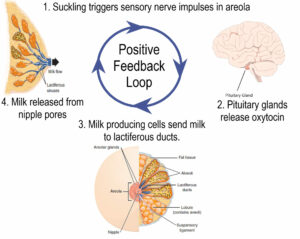Table of Contents

Definition:
Lactation can be defined as the process by which milk is released from a woman’s glands after childbirth. It is a process after which a woman is able to breastfeed her baby. The milk produced by a woman’s glands provides nutrition and immunization to the newborn. At the same time, having milk in the mammary gland is not enough but keeping it is important. The stage that stores milk production and requires prolactin and oxytocin is called Galactopoiesis.
Pregnancy and Breastfeeding Relationships
Lactation is a process that cannot occur in a woman’s body without pregnancy. Therefore, there is a deeper relationship between pregnancy and breastfeeding.
Breastfeeding Preparation
Generally, the female is ready to produce milk during the fifth or sixth month of her pregnancy. During the last stages of pregnancy, a woman enters the early stages of lactogenesis. At this stage in pregnancy, a woman’s bread makes a thick, yellow liquid known as Colostrum which is extremely nutritious and beneficial for the baby as it is rich in immunoglobulin A which enhances the immunity of the newborn. It prevents any germs from affecting the baby’s body and also prevents allergies. This fluid is also called infant formula.
Breastfeeding process
The process by which milk is produced in a woman’s breast is called Lactation. This process takes place in the following steps as described below –
- The breast begins to grow during pregnancy due to the influence of ovarian and placental hormones. It continues to grow even after birth.
- A certain amount of milk is produced in the breast during this time.
- There is an increase in milk production after childbirth.
- Milk is released from the mammary gland itself during breastfeeding.
Hormones Responsible for Breastfeeding
Certain hormones are responsible for the Lactation process.
Let’s take a look –
- Hormones are involved in the absorption of Estrogen, placental lactogenic, progesterone, prolactin, and oxytocin.
- This hormone helps to increase breast size during pregnancy caused by breast tissue growth.
- The hormone known as the placental lactogenic hormone is high in our body during pregnancy as this hormone helps to promote the growth of nipples, areola, and breast tissue.
- Progesterone is a hormone that helps to increase breast size and improve milk production in the body. The hormone progesterone level usually decreases during the post-pregnancy period which helps to stimulate milk production.
- The hormone that helps to differentiate cells that perform certain functions is called Prolactin.
- The alveolus is a hormone responsible for milk production after birth. This hormone starts to work mainly due to the hormone prolactin. The hormone prolactin is produced in combination with the hormone cortisol.
- Once the nipples are controlled, the hormone oxytocin is released which causes the alveoli to contract and help to squeeze milk out of the digestive system. The whole process is called Lowering However, this process only starts when the breasts are stimulated.
Things to Avoid When Breastfeeding
It is said that during pregnancy and lactation, what the mother eats or drinks, is automatically eaten by the baby. Therefore, this is an important time, the mother needs to look after the things she eats. Certain things should be avoided during breastfeeding. This includes-
- Reducing caffeine consumption
- Drug awareness
- Resist the urge to lose weight by eating supplements
- Alcohol and smoking should be stopped altogether
Is Lactation Possible Without Pregnancy?
Yes, artificial lactation can occur without pregnancy. There are three hormones that play a key role in rejuvenating the milk produced in the breasts of a nursing mother. If anyone takes medication between these three hormones in the form of ingredients, then there is a chance that a woman can produce breast milk without pregnancy.
At the same time, there are other cases in which lactation can occur without pregnancy. These include:
- Side effects of drugs/medicines.
- Health problems.
- Emotional irritation in the breast area.
- Excess production of the hormone prolactin in the brain.
Features of Breastfeeding
After maturation, milk is different compared to milk in the first stage of breastfeeding. Milk produced during lactation is well established.
- Colostrum is milk produced in the first stage of breastfeeding
- The composition of the milk changes gradually after birth. Temporary milk is replaced from colostrum within four to five days from birth.
- Mature milk is produced in the breast glands after 14 to 15 days of birth
- Gradually, after the need for milk has been reduced by the baby, termination of lactation occurs.
Also read: Important Topic Of Biology: Parturition
FAQs
Define Breastfeeding
Breastfeeding can be defined as the process of milking out of a woman's genitals after childbirth. It is a process after which a woman is able to breastfeed her baby. The milk produced by a woman's glands provides nutrition and immunization to the newborn. At the same time, having milk in the mammary gland is not enough but keeping it is important. The stage that stores milk production and requires prolactin and oxytocin is called Galactopoiesis.
What is the Hormone that controls Breastfeeding?
The hormones responsible for Lactation are Estrogen, Placental lactogenic, Progesterone, Prolactin, and Oxytocin.





